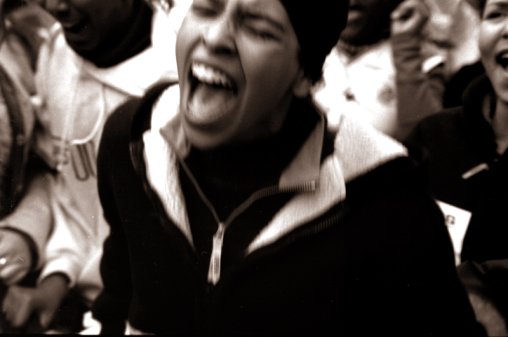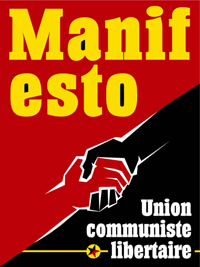 To destroy Patriarchy
To destroy Patriarchy
The fight for emancipation and equality between men and women is one of the essential themes of the anarchist struggle. Our objective is the abolition of patriarchy as a system of domination ; civil and social equality between men and women ; and women’s freedom to have control over their body, their capacity of reproduction and their sexuality as they like, in the private, domestic space as well as in the public space.
We reject all forms of discrimination based on sex, gender and sexual orientation. Indeed, we consider transphobia, homophobia, biphobia, lesbophobia and discrimination against intersex individuals as signs of patriarchy. They are notably based on the existence of only two distinct categories of sexes, which leads to the mutilation of intersex individuals, and on the supremacy of a dominant heterosexual model. We fight against these forms of oppression while acknowledging the interconnection and the specificities of LGBTI struggles.
Patriarchy is a political and economic system based on the gendered division of work which results in the domestic exploitation that women all over the world are still subjected to nowadays. It produces sexist culture, solidified in a system of traditions and customs, laws and social codes.
Sexism is the set of prejudices that confer « inborn » qualities or faults to each gender. The « natural qualities » attributed by sexist prejudices lead to a process of prioritization between the group of men and the group of women. Patriarchy uses gender – which is a social construction – as a ground to justify both the existence of male and female categories and the inequalities between the two, as well as violence against women and assigned roles according to gender ; it is also used to impose norms regarding heterosexuality and family structure. Intersecting with other relationships of domination based on social class, skin colour, sexual orientation, real or supposed beliefs, age, administrative situation, etc., patriarchy entails other forms of domination.
The domination is at once ideological, cultural, social, economic and political, relegating women to subordinate roles and dispossessing them of the control over their lives, their bodies, their sexuality. It is also physical, with domestic violence, harassment, sexual violence, all of which disrupt women’s lives both through their reality and through the constant threat that they represent.
Women’s acquired rights constantly challenged
Over the last decades, the feminist and anti-patriarchal struggle has permitted real progress in people’s consciousness and in life. Yet no social gain is ever definitive ; we have to defend acquired rights and to extend them further.
In all the places where some ground has been gained–equal rights, professional equality, abortion and contraception–some reactionary movements are fighting back in order to maintain the system of patriarchal domination.
A specific struggle is necessary
The struggle against patriarchy is a specific struggle which does not boil down to the struggle against capitalism, although each feeds on the other. Capitalism takes advantage of the unpaid work still mostly done by women in the reproduction of the labour force : to give birth, to bring up and educate the children, to do the housework and care work. It relies on the patriarchal system to overexploit women in very poorly-valued and underpaid jobs. But patriarchy does not serve only the capitalist class. Indeed, even within our social camp, men benefit from women’s unpaid work and find themselves relieved from a certain number of tasks that women will spontaneously undertake, influenced by the various mechanisms which maintain and reinforce this relationship of domination.
More affected by enforced part-time work, unemployment, precarious employment, women are used as a variable to be adjusted by employers according to their labour requirements. Reciprocally, the domestic tasks assigned to women (care services, housework...) in turn determine the gendered division of work (the gender-biased and hierarchical assignment of tasks and trades).
Religions and State are also active supporters of patriarchy by imposing a moral order and a heteronormative, hierarchical family model, and by exposing women and sexual minorities to institutional and police violence. Rather than the patriarchal family structure, we defend all forms of familial and sexual associations free of hierarchy, based on consent and willing to take into account the rights of the children of LGBTI people who are also victims of violence and oppression.
Inclusive and egalitarian practices
Revolutionary organizations are made of people who are members of a society at a given time, and thereby vehicles for prejudice, operating modes, conditioning and habits unconsciously acquired through their education, in spite of their wish to create a more egalitarian society. That is why it is up to us to fight against patriarchy within our organization as well, with all the tools available to us :
- to work towards making our organization inclusive, through its practices, for women and gender minorities ;
- to organize ourselves in a non-sexist way (when sharing out tasks, let us avoid “politics for men, logistics for women”) ;
- to favour access to responsibility for women and gender minorities at local or federal level by training men to refrain from domineering attitudes ;
- to confront sexual or sexist violence by exercising vigilance and making aggressors feel insecure ; they will not be tolerated within the UCL, or in our circles ;
- to favour women-only spaces for debate in order to liberate speech ;
- to question our own habits and reflexes so as to ensure that household and affective tasks will not be automatically assigned to the female members of our organization ;
- to acquire tools favouring speech for the most timid and the least experienced members.
We reject the traditional conception of the revolutionary activist whose availability for the cause is based on the domestic confinement of his spouse. We are seeking to develop a new, alternative form of activism such as will not reproduce patriarchal relationships and domestic alienations within the emancipation movement.








